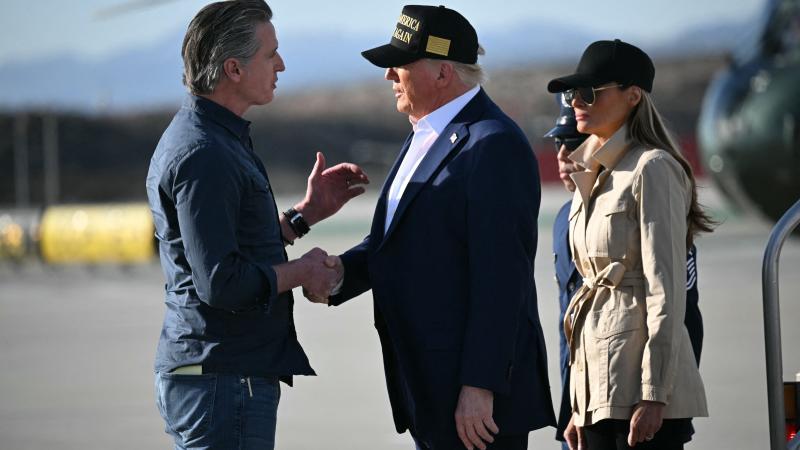Former prosecutors say judge should have recused self from Trump search warrant approval
"It probably would have been better had this magistrate judge not signed the warrant," former AUSA says.
The federal magistrate who once questioned Donald Trump’s moral stature and recused himself from a case involving the former president over impartiality concerns should have stepped aside from approving the search warrant for the Mar-a-Lago raid, two former federal prosecutors told Just the News.
“It would probably have been best to pass on on entertaining an application, an affidavit from the government,” former Assistant U.S. Attorney David X. Sullivan told the Just the News, Not Noise television show Thursday.
Former federal prosecutor Kash Patel, a former aide to Trump, suggested the former president’s legal team should consider filing a motion to disqualify Magistrate Bruce Reinhart from further action in the case for Facebook comments disparaging Trump he made in 2017 before he joined the bench.
"It's something he should definitely consider with his legal team," Patel told the John Solomon Reports podcast.
Reinhart also previously recused himself from a civil case between Trump and former Secretary of State Hillary Clinton.
Patel said the Trump team ought to take a legal approach that will publicly reveal as many details on the lead up to the raid as possible.
The former president's attorneys should "calculate a way forward that not only helps to exonerate President Trump, but also at the same time, shows the American people what happened and there's a couple of different ways to do that," he said.
Both men discussed the case on a whirlwind day in which Attorney General Merrick Garland confirmed he personally approved the raid on Trump’s compound, while congressional Republicans escalated their concerns about the departments handling of the whole matter.
Agents with the Washington Field Office on Monday scoured Trump's Mar-a-Lago estate near Palm Beach seeking classified documents the former president may have taken from the White House. The same field office has faced scrutiny over whistleblower claims of partisan bias by its highest level personnel.
Sullivan said Garland's press conference Thursday seemed belated given the public concern.
"The fact that it took really three or four days for the attorney general, to make a statement at all was sort of curious,” he said.
"The fact that he had said that he had made the decision, made the call, and that he was prepared to release the warrant, while the warrant is nice, but really, it's the application and the affidavit in support of that warrant that was brought to the federal magistrate judge that really has all the information," he said.
Host John Solomon then explained that Trump received an FBI subpoena in June and cooperated with the agency's investigation. He questioned Sullivan as to whether the raid was an appropriate step given the former president was cooperating with the authorities.
"You can really have a hybrid result or path to follow," he answered. "And that would be if you issued and served a grand jury subpoena for documents, and whether there's been partial compliance, no compliance, or you're simply not satisfied with the compliance that they have given to you, you can seek judicial enforcement of that subpoena."
"I've done that many times for the IRS as administrative subpoena power, probably about 100 times," he added. "So absent exigent circumstances, I think it's very curious that your next pursuit would be getting a search warrant, especially for a former president of the United States. I think they had to understand that there would be a lot of consequences and a lot of questions arising from that decision.”
Cohost Amanda Head asked if Reinhart's approval of the search warrant was unusual, given his previous recusal from a case involving Trump.
"Well, that's that's an interesting point. But in this instance, a federal magistrate judge, and I don't know how that Federal District works, but in many, the judicial officers will rotate as to who would be entertaining applications for search warrants, arrest warrants, seizure warrants from the government at any given time," he said. "It may change weekly, it may have been that it just was this magistrate judges moment to entertain the application."
"But as far as recusing from cases, I think that's one thing," Sullivan continued. "And I think it's something that we should all be rather critical of, but at the same time, the only thing this magistrate judge would be doing would be trying to make a determination as to whether or not probable cause exists to you know, really balanced that with the President's Fourth Amendment issues or rights to privacy at Mar a Lago, so I think it probably would have been Better had this magistrate judge not presided over this application."
"But clearly there's a history there. And that's something that a lot of people are so fractured in this country right now that, you know, it probably would have been better had this magistrate judge not signed the warrant," he concluded.
Solomon then him if Trump had a legal basis to challenge the warrant, saying Reinhart should have disqualified himself from the application.
"Well, you really can't file a motion to disqualify when it's an ex parte application for a warrant," he answered. "At that point, it's not an adversarial proceeding. Should they challenge the legality of the search? That may come into play, but I don't think that it would be this magistrate judge, that would be presiding over any Fourth Amendment claims by Mr. Trump's attorneys."
"But given what you just told me, John, it would probably have been best to pass on on entertaining an application, an affidavit from the government, in this regard, I think, you know, it's bad form," Sullivan opined. "And while I'm sure you know, the threshold for probable cause, in this instance, is relatively low. So I think another judge looking at this would say, ‘Well, I would have made the same finding.’ So perhaps it would be maybe harmless error at best. We'll see. There's a lot we have to learn."
















